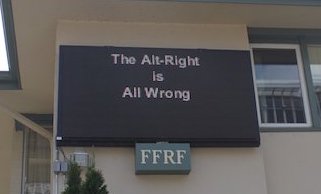Mobile Menu

Lauryn Seering
Freethought Radio -- August 16, 2018
Irreverent billboard campaign continues in Cobb County, Ga.
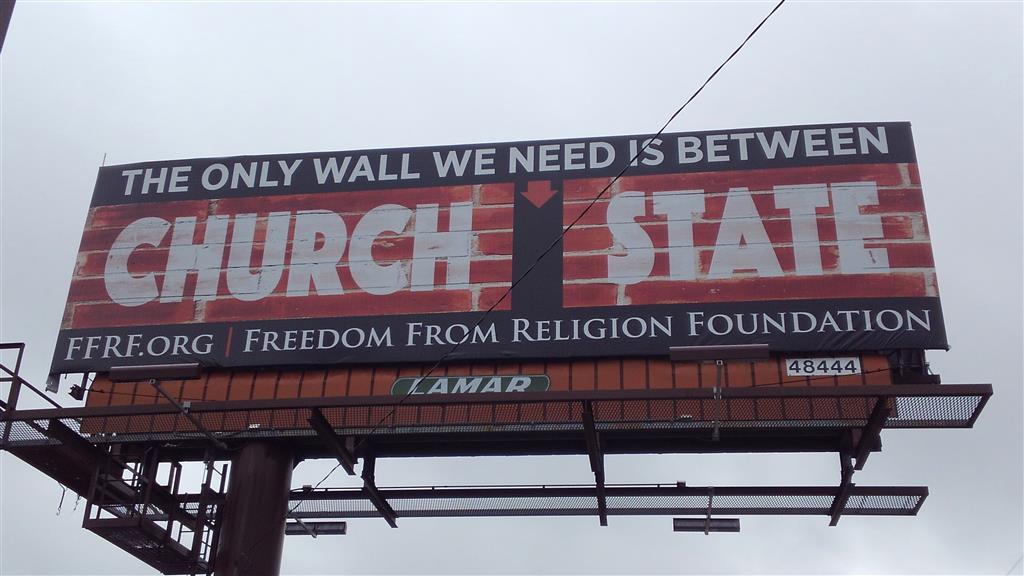
The Freedom From Religion Foundation is continuing its irreverent 2018 Georgia billboard campaign in suburban Atlanta with two new additions this August.
“Enjoy life now — There is no afterlife” is appearing on a digital board on Spring Road half a mile east of Atlanta Road in Smyrna, Ga.
A contrasting message promoting the constitutional separation between state and church proclaims “The only wall we need is between church and state” on a vinyl billboard on Piedmont, near the intersection of Sandy Plains in suburban Marietta.
The phrase “Enjoy life now — There is no afterlife” was coined by an octogenarian farmer, now deceased, who sponsored the message on billboards for many years in rural Wisconsin.
Now Jack Egger, a local Georgia FFRF member and activist, has taken the message to heart. He is underwriting a year-long billboard campaign in suburban Atlanta to champion FFRF’s two purposes: To educate the public about nontheism, and to safeguard the constitutional separation between church and state.
If there were more space on a billboard, FFRF says it might express the sentiment more fully by reprinting Emily Dickinson’s poem on the topic of immortality (or the lack thereof):
That it will never come again
Is what makes life so sweet.
Believing what we don’t believe
Does not exhilarate.
FFRF thanks Jack Egger for his generosity. FFRF has 32,000 members nationwide, including more than 500 in Georgia.

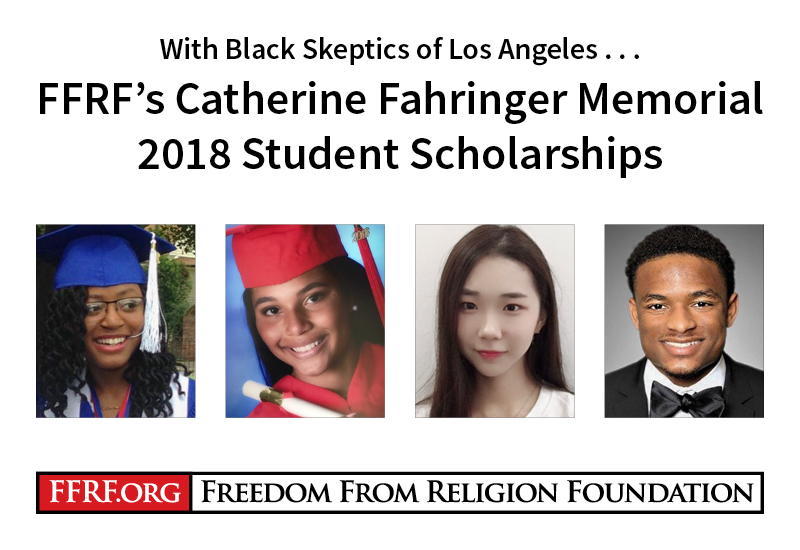
The Freedom From Religion Foundation is giving $10,000 in scholarship awards to four students in partnership with Black Skeptics of Los Angeles, an African-American atheist community group.
For the fourth year in a row, FFRF has divided its $10,000 annual Catherine Fahringer Memorial Award between four outstanding secular students of color. The scholarship is part of BSLA’s First in the Family Humanist Scholarship program, which focuses on undocumented, foster care, homeless or LGBTQ youth who are underrepresented in the college population and will be the first in their family to go to college.
According to BSLA founder Sikivu Hutchinson, “Secular African American youth disproportionately come from religious backgrounds and communities. These youth are often marginalized in K12 and higher education due to their non-conformity. This scholarship program provides a platform for their voices and experiences.”
This year’s winners are: Huanchun Xu, 20, (Borough of Manhattan Community College); Mike Grimes, 18 (Honors College Charleston); Shalvit Grimes, 18, (St. John’s University) and Desmyon Jones, 18, (University of Memphis). Each recipient will receive $2,500 to support their college education and expenses.
Fahringer, whom this award is in memory of, was a feisty feminist and freethinking activist in San Antonio who ran a long-lived FFRF chapter, and served on FFRF’s executive board for many years. She was especially interested in nurturing the next generation of freethinkers. She died in 2008.
“We are very pleased to work with Black Skeptics to be able to help expand educational opportunities for these outstanding students,” says FFRF Co-President Annie Laurie Gaylor. “This next generation of freethinkers is living Catherine’s legacy.”
FFRF is a Wisconsin-based nonprofit organization with more than 32,000 members across the country, including more than 4,000 in California. FFRF, now celebrating its 40th year, works to protect the constitutional principle of separation between state and church, and to educate the public on matters relating to nontheism.
V. S. Naipaul
Call your senators today to delay Kavanaugh confirmation hearing
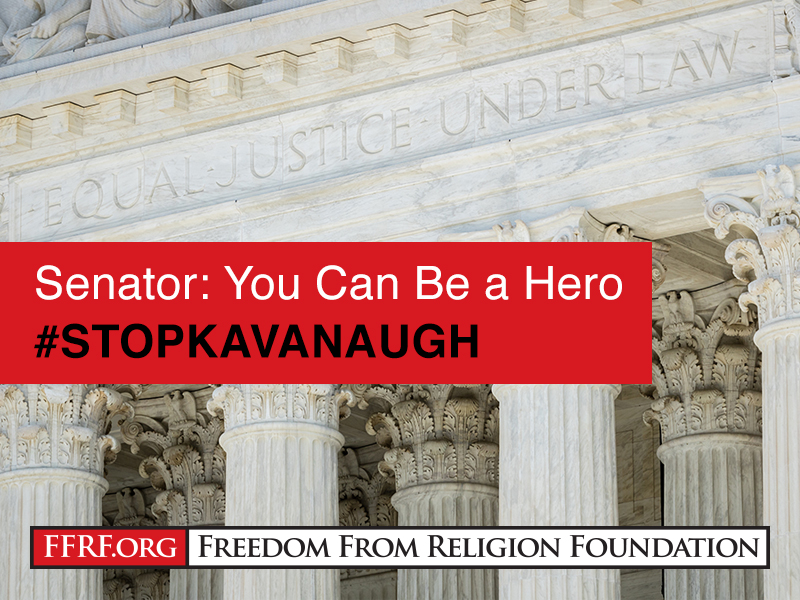
In a desperate rush to push through an unvetted nominee before a contentious election, the Senate Judiciary Committee has scheduled a hearing for Supreme Court nominee Brett Kavanaugh in three weeks, on September 4.
As the Freedom From Religion Foundation has detailed, Kavanaugh will be a disaster for state-church separation, taking the place of relative moderate Anthony Kennedy and tilting the court toward religious favoritism for the foreseeable future.
Every American who values the First Amendment, religious freedom, and the separation of state and church should call their senators — (202) 224-3121 — to oppose Kavanaugh’s nomination.
A wrecking ball aimed at the wall.
Kavanaugh would tear down Thomas Jefferson’s “wall of separation between church and state.” He’s all but said so, praising judges who “persuasively criticized” Jefferson’s metaphor of a strict “wall of separation between church and state.” Jefferson’s metaphor explains the meaning of the Establishment Clause, for which he drafted the legislative precursor. Although that metaphor has been adopted by the Supreme Court since 1878, Kavanaugh charges it is “based on bad history,” is “useless as a guide to judging,” and, most alarmingly, is “wrong as a matter of law and history.”
If Kavanaugh has his way, prayers will be broadcast over loudspeakers in public schools, taxpayer money will flow directly to churches and religious schools, secular Americans will be marginalized, religious minorities will be second-class citizens, and Christians will be privileged above all. For Kavanaugh, “history and tradition” justify any violation of of the constitutional principle of separation between state and church.
No records, no hearing, no vote.
The purpose of Senate Judiciary Committee hearings is to vet any nominee. But Kavanaugh’s hearing has been scheduled despite the fact that hundreds of thousands of his records are still being concealed. It is premature to schedule that hearing before the disclosure of these records. Every other recent Supreme Court nominee has had all their government service records disclosed and fully vetted prior to their confirmation hearings. Senate Judiciary Chair Chuck Grassley and Kavanaugh’s supporters are trying to dodge this requirement.
That’s because Kavanaugh may have misled the Senate when he was confirmed to the D.C. Circuit in 2006. Senator Leahy wrote about this in a New York Times op-ed: “Senator Dick Durbin and I asked about his knowledge of several Bush-era scandals, including warrantless wiretapping, torture and detainee treatment. Judge Kavanaugh testified that he had no knowledge of such issues until he read about them in the newspaper. But a year after his confirmation, press reports indicated that he had participated in a heated discussion in the White House over the legality of detainee policies.”
If a judicial nominee lied to or misled the Senate in a prior confirmation hearing, that’s a national scandal. It’s vital to take the time to determine whether there is any truth to the matter, if only to give a new justice a clean slate.
It is shocking that the Senate would even consider someone for a lifetime appointment to our highest court without fully vetting that individual. There is no legitimate reason to rush a Supreme Court nominee through. The Court limped along with eight justices for more than a year when the Senate refused to give Merrick Garland, President Obama’s nominee to replace Antonin Scalia, a hearing.
Whatever your party, whatever your senators’ parties, your senators need to hear from you. This is a bipartisan issue. No records, no hearing. It’s pointless to have a hearing vetting a nominee when his record is not available to vet. No records, no hearing. No hearing, no vote. Call your senators now (202) 224-3121.
FFRF objects to Kissimmee mayor’s call for prayer
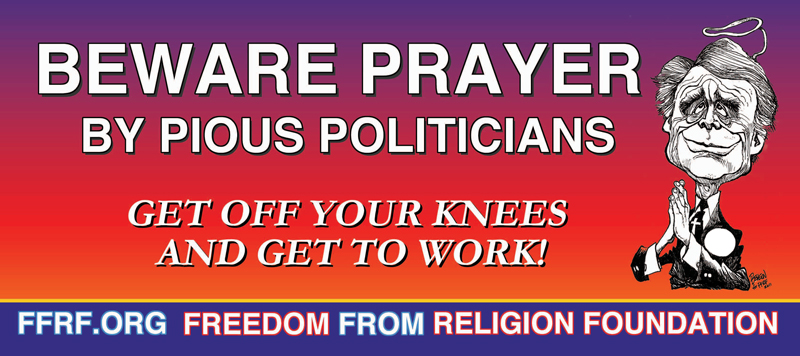
The Freedom From Religion Foundation, a national state/church watchdog, is asking the mayor of Kissimmee, Fla., to rescind an unconstitutional proclamation calling for prayer, and to cancel an upcoming city prayer event.
Mayor Jose A. Alvarez Alvarez signed a proclamation on Aug. 7 declaring 40 days of prayer in the city of Kissimmee. The proclamation reads in part:
“WHEREAS, members of the City of Kissimmee are celebrating this hope for the City with 40 days of prayer for peace, justice, love and solidarity between men and women of all faiths, and invite all residents to join them in this celebration by praying, doing acts of kindness, watching over the safety of neighbors and fellow citizens, volunteering and uniting to help those in need to make our City the best place to live.”
While the language of the proclamation itself is largely laudable and secular, such as promoting “acts of kindness,” FFRF notes that injecting religion into an official government pronouncement alienates a substantial portion of the community and is an improper endorsement of religion.
Although the proclamation itself does not include a call to fast, Commissioner Olga Gonzalez has indicated that’s part of the purpose: “This is a prayer and a fasting just because of the things that are going on around the world, the hurricanes, all the displacements of families, and all the things that are going around, not just in Kissimmee but the world.”
Compounding the proclamation violation is the city’s organization of an event on Aug. 21 to implement the call to prayer. In their letter to Alvarez, FFRF Co-Presidents Dan Barker and Annie Laurie Gaylor ask him to cancel this event. They remind the mayor that “using your official capacity as mayor to unabashedly promote a religious ritual, like fasting or prayer, sends an official and impermissible message of religious endorsement and of exclusion to many of your constituents.” They also point to an 1808 letter from President Thomas Jefferson, in which he specifically rejected the notion that government officials have the authority to issue prayer or fasting proclamations.
Prayer is not a legal or effective way of uniting a community, FFRF notes, as it excludes the nearly quarter of adult Americans who identify as nonreligious, while also betraying the constitutional principle of separation between state and church.
“Helping hands are far more effective than prayer. Our message to pious politicians is: Get off your knees and get to work,” adds Gaylor.
FFRF represents more than 32,000 nonreligious Americans, including members in Kissimmee with more than 1,500 throughout Florida, plus a central Florida chapter.

The Freedom From Religion Foundation, a national state/church watchdog, is formally objecting to religious patches on Shelby County, Ohio officer uniforms.
After receiving a complaint about the patches, which say “For God and Country,” FFRF sent a letter to the Sheriff’s Office requesting the patches be removed immediately.
“It is inappropriate and unconstitutional for the Shelby County Sheriff’s Office to promote or endorse religion,” reads FFRF’s letter. “Anyone viewing these patches would understand the Sheriff’s Office to be endorsing religion and belief in a god.”
Additionally, it is unconstitutional and coercive to require Sheriff’s Office employees to display a religious message on their uniform, FFRF points out.
“Officers of the law take an oath to protect and serve all citizens,” writes FFRF Co-President Annie Laurie Gaylor. “It is impossible for citizens to feel equally protected when officers openly display religious preference on their uniforms.”
Law enforcement must be impartial and avoid any appearance of bias toward some citizens or hostility toward others. Religious endorsements made by a department send a message that excludes the 24 percent of American adults who identify as nonreligious, including 38 percent of Millennials and younger Americans. The Shelby County Sheriff’s Office is needlessly alienating non-Christian and nonreligious citizens in its city, turning them into political outsiders in their own community.
Gaylor expressed concern that the patches not only send an intimidating and unconstitutional message to the public, but an exclusionary one to sheriff’s deputies, who themselves might be nonreligious.
Government employees can worship, pray, or read any religious text they wish when acting in their personal capacities. But they are not permitted to provide prestige to their personal religion through the machinery of a government office. Sheriffs and deputies take an oath to uphold our godless and entirely secular constitution and must keep their personal religious views out of law enforcement, Gaylor added.
FFRF is a national nonprofit organization with more than 32,000 members across the country, including more than 800 members and a chapter in Ohio.
Project Blitz targets schoolchildren with godly agenda
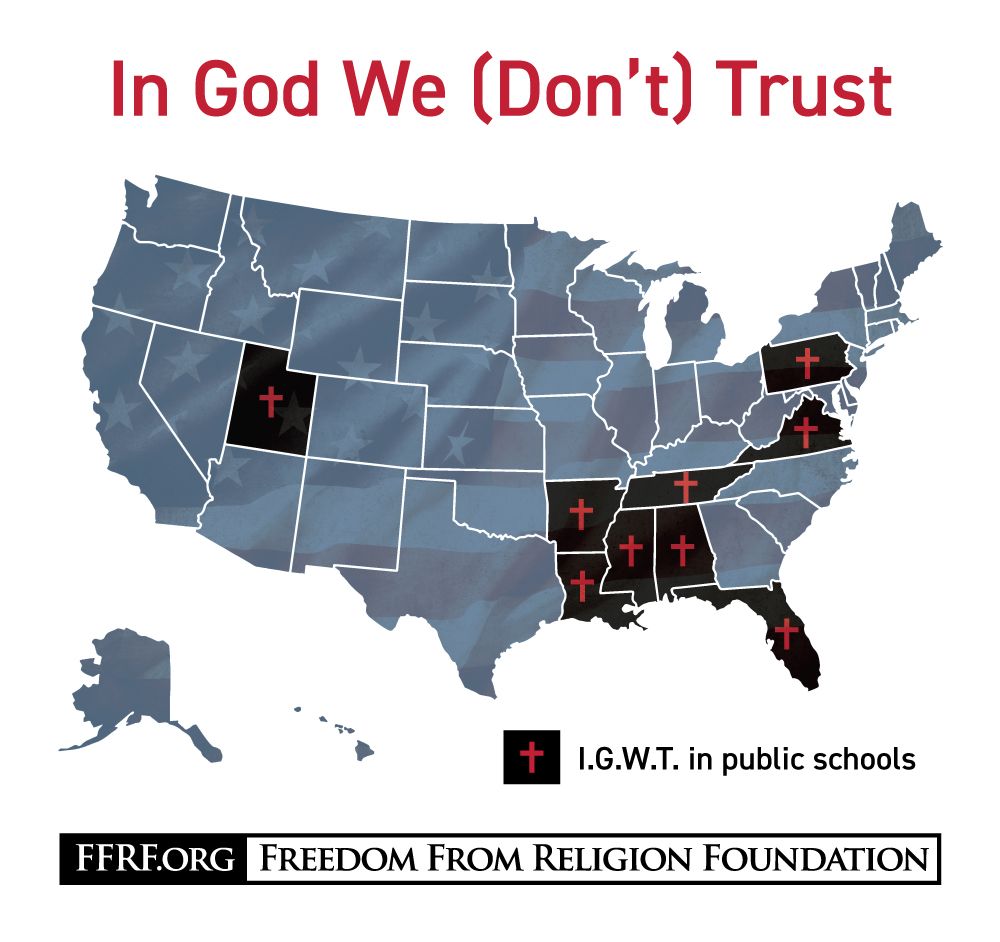
The Freedom From Religion Foundation is warning that at least nine state legislatures are promoting or even forcing display of a religious motto in public schools. As a captive audience of young, impressionable students return to classes for the new fall term, they may be greeted with signs, posters or other displays that proclaim “In God We Trust.”
In Florida, Rep. Kim Daniels, a Democratic legislator who runs a side ministry and speaks to demons (including demons whom she claimed looked like “Predator from the movie Predator”) sneaked the mandatory display requirement into an educational spending bill this spring. This was the cop-out legislation the state House of Representatives insultingly passed in the wake of the shooting massacre at Marjory Stoneman Douglas High School, while at the same time snubbing Parkland students seeking real reform.
In Arkansas, State Senator Jason Rapert, who also runs a side ministry and who was responsible for the Ten Commandments monument that FFRF is challenging in federal court, rammed through a bill last year requiring that a poster proclaiming “In God We Trust” must be displayed in public schools and government-owned buildings.
In Tennessee, a law was adopted this March requiring Tennessee schools to “prominently display” the pious national motto. One of the state reps who voted for the bill, Terri Lynn Weaver, “explained” that displaying the motto “will help future generations of students better understand the importance of faith and remind them that the very bedrock of our nation was built on the principles of the God of the Bible.”
In Alabama, a law took effect June 1 encouraging the voluntary posting of the national motto in classrooms, courthouses, office buildings, libraries and on law enforcement and service vehicles.
In Louisiana, public schools will be required to display “In God We Trust” on their buildings by August 2019, after passage of a mandatory posting law in May. State Sen. Regina Barrow argued it would help address “moral decay” in our public schools.
It’s no coincidence that many preachers-cum-legislators are proposing these bills and that the proponents are professing religious purposes. These laws are not intended to showcase the national motto or inspire patriotism. They are the thin edge of a Christian nationalist wedge, the proverbial camel’s nose under the tent.
This is no secret. Several Christian nationalist groups, including the Congressional Prayer Caucus Foundation and Wallbuilders (a propaganda outfit run by the notorious David Barton), have banded together to push for a number of state bills promoting religion under the ominous germanic moniker, “Project Blitz.”
The overarching goal of Project Blitz is to legislate Christianity, starting with seemingly more innocuous laws, such as the posting of the national motto, and progressing to laws that privilege the Christian majority, often by portraying it as a persecuted minority. Project Blitz is Christian nationalism masquerading as religious liberty. It’s a “legislative assault . . . meant to reshape America.” So far, we’ve seen more than 70 Project Blitz bills proposed in about 20 states.
(For the record, some of the “In God We Trust” posting laws predate Project Blitz. Mississippi’s law requiring mandatory posting of the religious motto was passed first, in 2001, as the result of the American Family Association pushing the most religious state in the country into using public schools to promote religion. Virginia, hard on Mississippi’s heels, passed its mandatory posting law the following year. Pennsylvania passed a law in 2016 to encourage posting of the motto, at the behest of pious sponsor Rick Saccone (whom FFRF sued over similar hijinks and who notably lost his bid for a House seat in a special election this year).
Regardless of which Christian Right outfit is behind any of these laws, the end goals are the same. These laws are about advancing the Big Lie that the United States was “founded on God” or Christianity, and dismantling the vaunted wall of separation between religion and government. The laws also promote the pernicious idea that piety is a prerequisite for being a good American.
The motto “In God We Trust” is inaccurate, exclusionary and aimed at brainwashing American schoolchildren into believing that our nation is a theocracy. “In God We Trust” was a johnny-come-lately, adopted as the national motto in 1956 at the height of the Red Scare. The original motto, “E Pluribus Unum” (From many [come] one), celebrating unity through diversity, was adopted by a committee of Jefferson, Adams and Franklin. The godly motto is nothing but a Cold War anachronism.
Barna, a religious polling outfit, recently found that 21% of younger Americans are either atheist or agnostic—not just nonreligious, but atheist or agnostic. As Anne Nicol Gaylor, FFRF’s principal founder, has always put it, “ ‘In God We Trust’ isn’t even accurate. In order to be accurate, it would have to say ‘In God Some of Us Trust,’ and wouldn’t that be silly?”
These godly postings exclude and alienate the one-in-five students in our public schools who do not believe in god. And they’re meant to. These laws are not about patriotism, they’re about turning believers into insiders, and nonbelievers into outsiders. There’s nothing patriotic in undermining our nation’s secular Constitution.
It’s hard to fight state laws mandating the posting of “In God We Trust” when attempts, including by FFRF, to legally challenge the words as our national motto have so far failed. FFRF is considering the best legal options for this rash of legislation. “In God We Trust” is a religious declaration, and therefore should not be placed on public property, much less in our public schools. Courts, including the Supreme Court, have held for more than 65 years that devotionals and religion in the public school setting violate the First Amendment.
FFRF is committed to fighting this nationalistic lie. Parents and students should contact their school board to oppose these displays. They should contact their legislators to ask them to repeal the laws or stand firmly against any new bills that might put “In God We Trust” in public schools. (FFRF has sent out many action alerts at the state level to our membership, making it easy to oppose such bills.) Most important, if students are alienated and impacted by these new displays, they should immediately contact FFRF’s legal department.
Freethought Radio -- August 9, 2018
FFRF urges unity and condemns racist “alt-right” rally
The Freedom From Religion Foundation strongly denounces the upcoming Aug. 12 “Unite The Right” rally in Washington, D.C. FFRF encourages its members and supporters in the area to attend a peaceful counter-protest as a message to hate-mongering white supremacists that their racist ideology will never unite the United States of America.
The Freedom From Religion Foundation office watched with horror and dismay as the march in Charlottesville, Va., last August ended in hours of violence, mayhem and three deaths. Our feelings turned to even greater revulsion and concern as the nation’s leader, charged with setting the moral tone in our country, shockingly stated that there were “fine people on both sides” and holding the “alt-left” equally culpable.
Unlike President Trump, the rest of us do not find it hard to condemn swastika-wielding neo-Nazis, white nationalists, neo-Confederates and anti-Semites, who espouse that the United States is “fundamentally a white man’s country.” This overt racism has roots in Christian nationalism, including the Ku Klux Klan.
David Duke, the former grand wizard of the KKK who spoke at the Charlottesville march last year and called it an effort to “take the country back” and “fulfill the promises of Donald Trump,” is a “born-again” Christian. The KKK is an explicitly Christian organization. Klansmen began burning crosses “to spread the light of Jesus into the countryside.” FFRF Co-President Dan Barker has catalogued the racist verses in the bible, including verses in which God himself is a slavemonger.
In today’s increasingly ugly and divisive climate, FFRF and freethinkers would indeed be culpable if we did not speak out against racist hate groups seeking to destroy our nation and and its core principles. FFRF unequivocally condemns white supremacist hate groups, racism, and the violence, hate, and discord they are unapologetically fomenting.
FFRF works to uphold constitutional principles, which include not only religious liberty, but revered principles of equality and equal justice under the law. We don’t believe in gods, but we do fervently believe in the “melting pot” of diverse peoples united together under the banner of our original, inclusive, de facto motto: E Pluribus Unum.
FFRF awards $10,550 in students of color 2018 essay contest
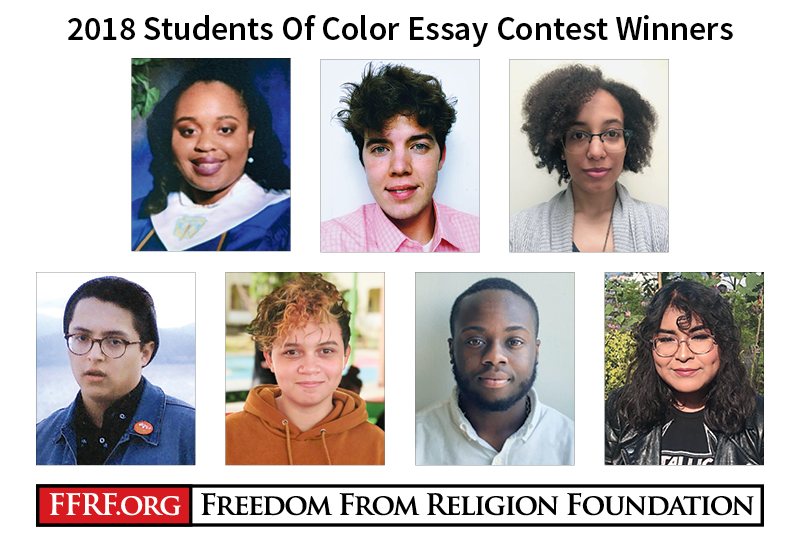
The Freedom From Religion Foundation is proud to announce the 15 winners of the 2018 David Hudak Memorial Students of Color Essay Competition for College Students. FFRF has paid out a total of $10,550 in award money for this year’s contest.
College students of color were asked to write a personal, persuasive essay about the “Challenges of being a student of color who rejects religion.”
This is the third year FFRF has offered a contest geared specifically to acknowledge and reward freethinking students of color, and the challenges they face as a minority within the nonreligious minority.
FFRF’s three other contests — for college-bound high school seniors (announced last month), for ongoing college students (to be announced later in August) and for grad students (to be announced in September) — are open to any student. FFRF first started offering college essay competitions in 1979, adding high school senior contests in 1994 and graduate students in 2010.
“We feel that these scholarships encouraging young freethinkers to express themselves and rewarding their independent thinking is one of FFRF’s most important projects — an investment in the future,” says FFRF Co-President Annie Laurie Gaylor.
Major winners (pictured above) are:
First place
MiKaelah Freeman, 18, New York University ($3,000), who wrote about “Black Plague: The Role of Christianity in Slavery and How it Plagues African Americans Today.”
Second place
Michael Brown, 24, Dartmouth College ($2,000), whose essay was titled, “Free of Thought, But Not Free of Color.”
Third place
Noemi Rosario, 18, University at Albany (SUNY) ($1,000), whose essay was titled “Place Your Bet.”
Fourth place
Johann Rucker, 22, University of Nevada-Las Vegas ($750), who wrote an essay called “Thank You, Tio Carlos.”
Fifth place
Alondra Vega Rivera, 18, Escuela de Artes Plasticas y Diseno de Puerto Rico ($600), who wrote as a “Spanish-Speaking Heathen.”
Sixth place
Azarius Williams, 20, Syracuse University ($500), who wrote on “My Journey to Secularism.”
Seventh place
Jesica Maldonado Matias, 18, San Francisco State University ($400), whose essay was called “The God That Failed Me.”
Honorable mentions ($200 each) are:
- Joseph Florida, 21, Southern University A&M College, who wrote about “My Experience as a Skeptic of Color.”
- Anissa Foster, 18, Stanford University, whose essay was titled, “Dangerous Woman.”
- Kelvin Martinez Gomez, Rensselaer Polytechnic Institute ($100 bonus), who wrote on “How Do You Say Atheist in Spanish?”
- Alexandra Harmon,19, Howard University, whose essay was called “A Wolf in Black Sheep’s Clothing.”
- Shejan Heaven, 19, University of Georgia, who wrote about “Discovering the Unknown.”
- Evan Malcolm, 21, University of South Florida, who wrote about “A Matter of Perception.”
- Tatem Rios, 18, Inver Hills Community College, who wrote about “The Challenge of Being a Freethinker in This Society.”
- Therrin Wilson, 21, University of Tennessee, who wrote about “False Prophets.”
The contest is named for the late David Hudak, an FFRF member who left a bequest designated to generously fund a student essay contest. The winning essays will be reprinted or excerpted in the upcoming September issue of Freethought Today, a periodical that is included with membership in FFRF.
FFRF thanks FFRF members Dean and Dorea Schramm of Florida for providing a $100 bonus to students who are members of a secular student club or other freethinking group. The grand total reflects those bonuses.
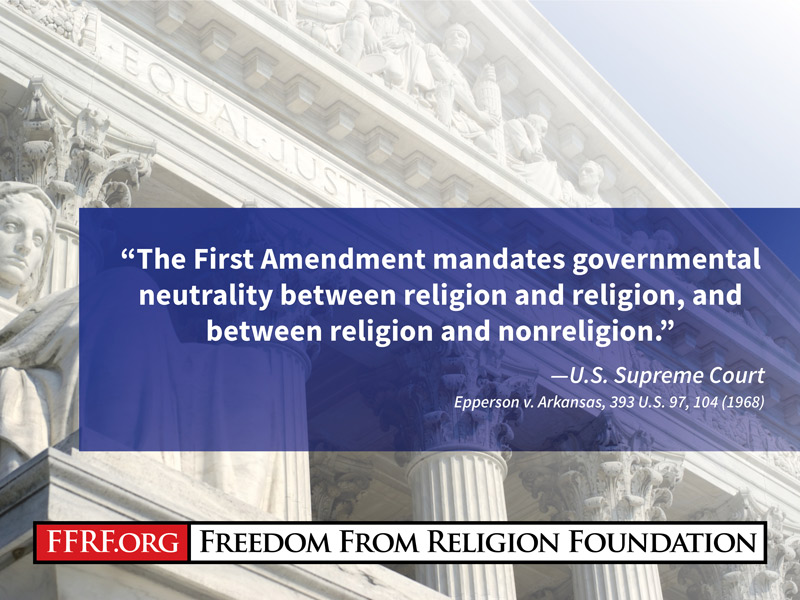
A national state/church watchdog has sent a complaint letter to Mobile County Public Schools, Ala., over a mandatory staff event that turned into a mandatory religious service.
Pastor Vint Norris from the Alabama District of the Assembly of God was invited to deliver what has been described as “a fire and brimstone invocation” at an August MCPS staff event. In response, the Freedom From Religion Foundation sent a letter asking the district to end scheduled prayer at all district meetings and events.
FFRF was made aware of this event by a concerned district employee who reported that Pastor Norris’ invocation was “not merely a prayer, it was a sermon,” reporting that several employees commented that “despite being devout, this made them uncomfortable.” Multiple MCPS employees also described the religious nature of the required staff assembly on Facebook.
“Let me just tell you, it was not only about school spirit, it was about the Holy Spirit! He was welcome in that place today. Pastor Vint gave the invocation and it was POWERFUL!” read the Facebook post of one attendee. “Every employee in MCPSS was prayed over today. Every student in MCPSS was prayed over today.”
“Today for the first time since I can remember MCPSS went to church and the church said AMEN!!” read another post. “God alive and working his way through MCPSS staff, not just teachers, but staff…”
The Constitution’s Establishment Clause, which ensures the continued separation of religion and government, mandates that the government may not in any way endorse religion. The First Amendment prohibits even the appearance of religious endorsement by government officials, FFRF noted. The occurrence of a religious sermon and the subsequent promotion of a specific set of religious values at a mandatory public school function violates these constitutional limits.
“While individuals are certainly free to pray or privately worship on their own time in their own way, calling upon MCPS employees to participate in prayer is coercive and beyond the scope of a secular employer,” writes Patrick O’Reiley FFRF Legal Fellow Christopher Line in an August 6 letter to the district. “Such prayer creates acrimony, makes minorities feel like political outsiders in their own place of work, and show unconstitutional governmental preference for religion over nonreligion.”
FFRF is awaiting a response from MCPS’ attorney over a requested district plan to remedy the First Amendment violation and to ensure that the practice of prayer at district meeting and events will no longer occur.
“We’re turning up the heat, because such a prayer sends the worst possible lesson to teachers and principals about religious devotions in public schools,” said Annie Laurie Gaylor, FFRF co-president. “Staff need to protect the rights of conscience of students and uphold more than 65 years of Supreme Court precedent against divisive religion in our public schools.”
The Freedom From Religion Foundation is a national non-profit organization founded in 1978 with more than 32,000 members, including members in Alabama. FFRF’s purposes are to protect the separation between state and church, and to educate the public on matters related to nontheism.
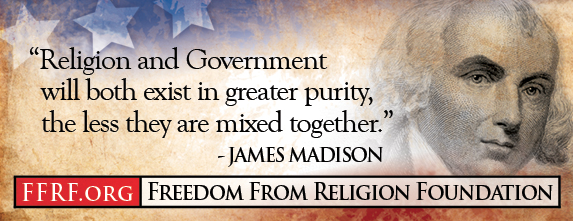
The Freedom From Religion Foundation has persuaded the city of North Miami Beach, Fla., to cease its sponsorship of National Day of Prayer events.
FFRF sent a letter to the Mayor of North Miami Beach on June 26, illuminating the unconstitutionality of the city’s sponsorship of National Day of Prayer events. FFRF became aware of the violations when a concerned citizen reported that each year the City of North Miami Beach sponsors and promotes a National Day of Prayer event. The sponsorship included promotion of the event on the city’s official social media pages and website, which directed citizens to R.S.V.P. to the event through the city’s Division of Public Affairs.
Aside from the inappropriate use of city resources for devotional purposes, FFRF also called attention to the discriminatory nature of the city-sponsored National Day of Prayer events.
“Legal arguments aside, these events are unnecessarily divisive,” wrote FFRF’s Patrick O’Reiley Legal Fellow Christopher Line. “The events send the message that the city not only prefers religion over non-religion, but also Christianity over all other faiths. They alienate non-Christians in North Miami Beach by turning them into political outsiders in their own community.”
In a July 31 letter, the North Miami Beach Mayor’s Office confirmed it would cease further city sponsorship of National Day of Prayer events:
“The city’s intent was not to be divisive nor portray the belief that the City prefers religion over non-religion, or Christianity over all other faiths,” the mayor’s office stated. “Nonetheless, the City is aware of the constitutional limitations regarding its involvement in organized religious activities and the separation of church and state. Therefore, the City of North Beach Miami will refrain from further organization and promotion of the National Day of Prayer events.”
FFRF applauds the city’s commitment to sponsoring secular community events that are welcoming to all citizens.
“Religion in government is innately divisive,” says FFRF Co-President Annie Laurie Gaylor. “We are very pleased the City of North Miami Beach has agreed to cease sponsoring what should be a private event.”
The Freedom From Religion Foundation is a national nonprofit organization with over 32,000 members across the country, including more than 1,500 members in Florida, and a chapter in central Florida. FFRF’s purposes are to protect the constitutional separation between state and church, and to educate the public on matters relating to nontheism.
U.S. should protest Saudi Arabian human rights violations
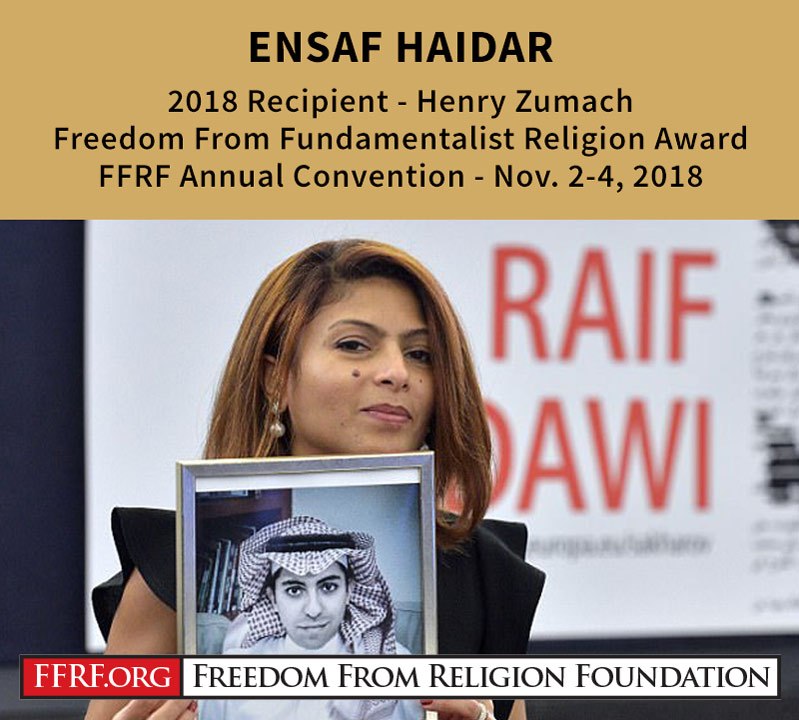
The United States should be following the lead of Canada in condemning human rights violations in Saudi Arabia. Instead, U.S. inaction corresponds to Saudi Arabia’s aggressive and reactionary response to Canada’s criticism of recent arrests of Saudi rights activists.
Yesterday, Saudi Arabia expelled the Canadian ambassador after Canada’s foreign minister called for the release of political prisoners Samar and Raif Badawi.
Canada’s admirable interest in ending the illegal and inhumane treatment of the Badawis is due in large part to the advocacy of Raif Badawi’s wife, advocate Ensaf Haidar. Haidar received political asylum in Canada along with her three children and became a Canadian citizen last month. Haidar, the president and cofounder of the Raif Badawi Foundation for Freedom, will be FFRF’s upcoming 2018 recipient of the $10,000 Henry Zumach Freedom From Religious Fundamentalism Award. She’ll be receiving the award and speaking at FFRF’s Nov. 2-4 national convention in San Francisco.
Raif Badawi, initially arrested on charges of apostasy, which carries an automatic death sentence, was convicted in July 2013 for founding an internet forum that “violates Islamic values and propagates liberal thought,” and was sentenced to 600 leashes and seven years in prison. He was re-sentenced in May 2014 to 1,000 lashes and 10 years in prison, with a major fine added. After Badawi was subjected to 50 lashes in 2015, a global movement sprang up in his defense, which halted the whippings.
It’s unclear why Badawi’s sister, Samar Badawi, was arrested last week. Ms. Badawi, a women’s and human rights activist and recipient of the U.S. State Department’s International Woman of Courage Award in 2012, was arrested two years ago for similarly undefined offenses under Saudi Arabia’s laws restricting free speech. Those laws continue to be harshly enforced by Crown Prince Mohammed bin Salman, despite his supposed reformist tendencies.
The New York Times reports that “the Saudi Foreign Ministry called the Canadian statements ‘blatant interference in the kingdom’s domestic affairs”’ and declared the Canadian ambassador, Dennis Horak, persona non grata, giving him 24 hours to leave the kingdom.”
In addition to expelling Horak, Saudia Arabia froze all business and investment deals with Canada and withdrew its own ambassador. Saudi Arabia also threatened to withdraw Saudi students from Canadian schools and universities. All of this for what The New York Times characterizes as a “pro forma complaint” from Canada.
On Monday morning, a pro-government Saudi Twitter account tweeted an infographic seemingly depicting an airliner headed toward the downtown Toronto skyline. The message, which was quickly deleted, superimposed over the threatening image a warning to Canada: “Sticking one’s nose where it doesn’t belong! He who interferes with what doesn’t concern him finds what doesn’t please him,” viewed as an overt reference to the terrorist attacks of September 11, 2001. Although the tweet was deleted, with an apology, another replaced it with the same wording, minus the threatening visual.

The U.S. State Department, for its part, offered little in response to the arrest of Badawi’s sister. The New York Times quoted an email from State Department spokeswoman Jessica Eldosoky: “We continue to encourage the government of Saudi Arabia to respect due process and to publicize information on the status of legal cases,” and will “address these broad concerns in our annual Human Rights Report.”
Clearly, standing up to theocrats in support of the right to free speech and expression is not high on the Trump Administration’s concerns. It should be. Especially when one of our closest allies is fighting on behalf of political prisoners.



